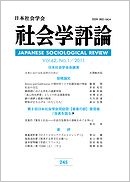All issues

Volume 42 (1991 - 199・・・
- Issue 4 Pages 332-
- Issue 3 Pages 229-
- Issue 2 Pages 110-
- Issue 1 Pages 2-
Volume 42, Issue 2
Displaying 1-12 of 12 articles from this issue
- |<
- <
- 1
- >
- >|
-
The case of CanberraMasao Nobe1991 Volume 42 Issue 2 Pages 110-125,221
Published: September 30, 1991
Released on J-STAGE: November 11, 2009
JOURNAL FREE ACCESSWellman integrated and summarised previous arguments on social networks into the 'Community Question' : that community has been 'lost', 'saved', or 'liberated' in contemporary cities. This study assessed the pattern of social networks in Canberra from the three perspectives of the 'Community Question'. To gather empirical evidence, a sample survey of women in four study areas of Canberra was conducted in 1986-1987. Three hundred and ninety-two women who were under 55 years of age and who were married or in a de facto relationship were interviewed. Analysis of their network ties has revealed the following :
(1) While primary ties in the neighbourhoods declined, people were compensated by their more extensive social networks, which ramified beyond their neighbourhoods and were dispersed in various places. In particular, kinship and friendship relationships flourished among them, and there was a tendency for people to be connected with others in more remote places. On balance, the 'community liberated' perspective is more consistent with the data than are either the 'lost' or the 'saved' perspectives.
(2) This pattern of social networks is due to the fact that a large proportion of middle class people constitutes the city and that the Canberra population was characterised by a significant proportion of residents who were born outside the city, whether elsewhere in Australia or overseas.
(3) In consideration of the above results, while residents in Canberra will diminish social ties with relatives and friends outside the city, they will develop kinship and friendship relationships in various locations within the city-relationships which are not constrained by geographical propinquity.View full abstractDownload PDF (1979K) -
Noriyuki Imaeda1991 Volume 42 Issue 2 Pages 126-139,221
Published: September 30, 1991
Released on J-STAGE: May 07, 2010
JOURNAL FREE ACCESSPostmodernism is criticized because it brings relativism, irrationalism and political nihilism. Many Japanese authors blame postmodernism for proclaiming the transcendence of modernity, since there remains collectivism and authoritarianism in Japanese society. But, in English speaking world, some authors point out that postmodernism has positive aspects.They judge that postmodernism involve a movement beyond oppressive binary categories. In fact, the meaning of postmodernism is ambivalent. In this paper, I search for the possibility of postmodernism in politics and social theory. For this purpose, I examine the postmodernism in architecture and the 'post-Marxism' that E. Laclau and C. Mouffe propose as a political turn of postmodernism. To find the possibility of postmodernism, it is important to reformu late postmodernism. That is to say, we need to think that postmodernism has the continuity and discontinuity of modernism, or that postomodernism is after-modern rather than anti-modern. If this reformulation is performed, the task of postmodernism become to go beyond objectivism and relativism.View full abstractDownload PDF (2020K) -
Tsuyoshi Hoshikawa1991 Volume 42 Issue 2 Pages 140-154,210
Published: September 30, 1991
Released on J-STAGE: November 11, 2009
JOURNAL FREE ACCESSDer Sozialisationstheorie von J. Habermas nach ist Sozialisation der Prozeß, in dem einer Erwachsende die Fähigkeiten der Handlungskoordinierung und die Selbständigkeit durch die Kommunikationen erwirbt.
Nun braucht es der Sozialisation in der folgenden Situation. Heute zunehmen die Verschiedenartigkeiten des Lebensstils und der Wertvorstellung. Dann erweitert die Freiheit der Selektion. Also muß man sich selbständig über die Dinge entscheiden, die man wahlen muß. Da entsteht die notwendige Situation, wo Leute miteinander die Handlungskoordinierung durch das Einverständnis machen müssen, das durch die Verstandigung vermittels der sprachlichen Kommunikation zwischen den Betreffenden bekommt wird, um ohne das Gebrauchen des Gewalt und den zu leichten Kompromiß ein Problem zu losen. Dafür braucht es einer Fähigkeit, der Interaktionskompetenz.
Dann betrachte ich in dieser Abhandlung, wie die Interaktionskompetenz als die Fähigkeit der Handlungskoordinierung sich entwickelt und selbständig wird. Dabei möchte ich einige Problematik der Sozialisationstheorie von Habermas nachweisen und eine neue Richtung der Sozialisationstheorie zeigen.View full abstractDownload PDF (1876K) -
[in Japanese]1991 Volume 42 Issue 2 Pages 155-156
Published: September 30, 1991
Released on J-STAGE: November 11, 2009
JOURNAL FREE ACCESSDownload PDF (222K) -
[in Japanese]1991 Volume 42 Issue 2 Pages 157-158
Published: September 30, 1991
Released on J-STAGE: November 11, 2009
JOURNAL FREE ACCESSDownload PDF (259K) -
[in Japanese]1991 Volume 42 Issue 2 Pages 159-160
Published: September 30, 1991
Released on J-STAGE: November 11, 2009
JOURNAL FREE ACCESSDownload PDF (189K) -
[in Japanese]1991 Volume 42 Issue 2 Pages 160-162
Published: September 30, 1991
Released on J-STAGE: November 11, 2009
JOURNAL FREE ACCESSDownload PDF (266K) -
[in Japanese]1991 Volume 42 Issue 2 Pages 162-166
Published: September 30, 1991
Released on J-STAGE: November 11, 2009
JOURNAL FREE ACCESSDownload PDF (634K) -
[in Japanese]1991 Volume 42 Issue 2 Pages 166-168
Published: September 30, 1991
Released on J-STAGE: November 11, 2009
JOURNAL FREE ACCESSDownload PDF (296K) -
[in Japanese]1991 Volume 42 Issue 2 Pages 168-169
Published: September 30, 1991
Released on J-STAGE: November 11, 2009
JOURNAL FREE ACCESSDownload PDF (200K) -
[in Japanese]1991 Volume 42 Issue 2 Pages 170-171
Published: September 30, 1991
Released on J-STAGE: November 11, 2009
JOURNAL FREE ACCESSDownload PDF (184K) -
1991 Volume 42 Issue 2 Pages 209-173
Published: September 30, 1991
Released on J-STAGE: February 19, 2010
JOURNAL FREE ACCESSDownload PDF (5334K)
- |<
- <
- 1
- >
- >|